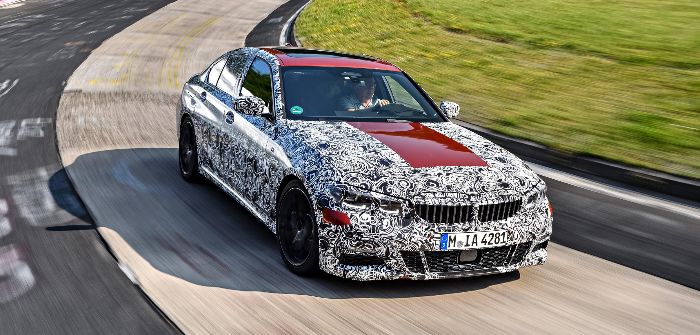The next-gen BMW 3 Series sedan recently completed the final stages of suspension and chassis development prior to the start of production at the Nürburgring Nordschleife. The program was particularly grueling, according to the OEM. The regime, which focused on the suspension, steering and braking systems during this stage, saw the engineers optimize the vehicle’s ride comfort and dynamic performance.
The track layout of the Nürburgring Nordschleife was ideal for refining the damper technology and other suspension components. “We’re using the progressive dampers as an active setup element so as to create supreme driving properties in all conditions,” explained Peter Langen, head of driving dynamics. “With short spring travel, a sensitive damping response ensures comfortable vibration compensation. When the car passes over large bumps, the body movements are controlled by increased damping forces.”
The car houses a thoroughly revised four-cylinder gasoline engine – the most powerful four-cylinder ever to be fitted in a BMW series production model. Fuel consumption is said to be 5% less than the predecessor engine. It is coupled with the newly developed 8-speed Steptronic transmission.
Not only is the body lighter and more rigid than that of the predecessor model, so to are the front and rear axles. This gives improved comfort while retaining a sporty driving experience. The key feature in terms of suspension development in the new BMW 3 Series Sedan is its innovative damping system. The 3 Series houses the first ever progressive dampers to be fitted in a BMW model. They function continuously and progressively to give smooth suspension travel. As such, the harshness that occurs when compensating for bumps on the road and during hard cornering can be neutralized gently and precisely.
The progressive dampers are a standard feature of the suspension technology in the new BMW 3 Series Sedan. In a specific setup they form part of the M Sport suspension, which includes a lowering of 0.4in/10mm, 18in light alloy wheels and mixed size performance tires. This provides enhanced driving dynamics. The increased damping forces can be felt on the Nordschleife in particular: in the M Sports suspension the damping is 20% higher than in the standard suspension. “This means the difference from the standard suspension is much more perceptible than before,” said Langen. “We’ve also made the M Sport suspension much sportier, with more rigid bushings and stabilizer bars and higher rate springs.”
In order to further reinforce the car’s sportiness, the new M Sport suspension is offered solely in combination with the Variable Sports Steering. In addition to speed-related steering assistance, an additional benefit is variable steering ratio. Variable Sports Steering has been specially tuned for the new BMW 3 Series Sedan. It responds with much greater precision to slight steering movements, without seeming nervous in the center position. The harmonious setup of the steering system can be felt on long bends as well as when changing direction several times in rapid succession. A linear build-up of steering forces and optimized feedback increase precision when cornering in dynamic style.
The M Sport differential is able to demonstrate its benefit on both the Nordschleife and the Grand Prix circuit. The electronically controlled locking function in the rear differential of the new BMW 3 Series sedan is linked to Dynamic Stability Control DSC, ensuring the best possible rotational speed compensation between the rear wheels on the inside and on the outside of the bend. Depending on the situation on the road, it is possible to pre-emptively influence both understeering and oversteering without brake intervention. The active differential lock distributes drive torque selectively between the rear wheels. This prevents slip on a wheel with reduced surface grip while ensuring that the engine power can be used to provide for the best acceleration out of corners.
“Unlike conventional mechanical locks, the regulated M Sport differential can optimize so much more than just traction,” commented Langen. “In addition to cornering dynamics, there is a particularly tangible increase in drive stability in the event of load changes, for example. This allows the new BMW 3 Series Sedan to be driven confidently and effortlessly even when traveling in dynamic style.”
For sporty driving, the active differential lock provides much higher levels of transverse grip as well as a boost in dynamic performance when accelerating out of bends. It also supports optimized stability, precision and cornering predictability in the new BMW 3 Series Sedan – all without brake intervention.


